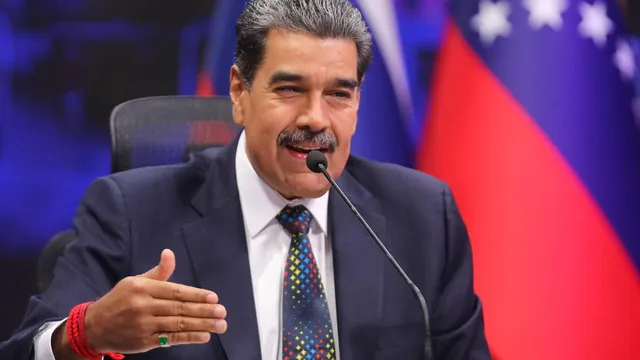
U.S. sanctions fail to remove Maduro in Venezuela
2025-04-11 05:50- U.S. sanctions targeting Venezuela's economy have not resulted in the ousting of Nicolás Maduro.
- Sanctions have worsened humanitarian conditions in Venezuela, leading to millions fleeing the country.
- Lifting sanctions might benefit the Venezuelan people, as current measures have inadvertently supported Maduro.
Express your sentiment!
Insights
In Venezuela, U.S. sanctions aimed at regime change have only served to entrench Nicolás Maduro's government since their implementation. Despite the sanctions targeting the country’s oil reserves and broader economy, the desired outcome of ousting the autocratic president has not materialized. Instead, more than 7 million Venezuelans have fled the country, exacerbating regional instability and worsening the humanitarian crisis. The sanctions have become a central instrument of U.S. foreign policy, yet they have disproportionately affected the most vulnerable populations, allowing the Maduro regime to leverage this suffering in its narrative against U.S. interference. Amidst this turmoil, the Maduro regime has also turned to military partnerships with Russia, acquiring advanced military systems like the SA-24 MANPADS. This military buildup is presented as a necessary defense against perceived threats from the United States. As Venezuela faces economic sanctions and diplomatic isolation, it has cultivated closer ties with Russia, relying on them for military hardware and support. By modernizing its military capabilities, the regime seeks both to deter foreign intervention and to strengthen its bargaining position with the U.S. government. Despite international condemnation and increasing isolation, the Maduro government has maneuvered the geopolitical landscape to maintain power. The regime has skillfully blamed its ongoing economic woes on American sanctions, framing them as an attack on Venezuela’s sovereignty. This strategy has allowed Maduro to galvanize public support by rallying citizens around a common enemy, diverting attention from internal challenges and the regime's failures. The evidence indicates that U.S. sanctions have exacerbated Venezuela's crisis and have ultimately cemented the Maduro administration's grip on power. Many argue that lifting the sanctions could lead to improved conditions for the Venezuelan people, while others contend that they are necessary for pressuring the regime. The issue remains contentious, with international opinions sharply divided over the efficacy of sanctions as a tool for achieving political change.
Contexts
The impact of U.S. sanctions on Venezuela has been profound and multi-faceted, severely affecting the country's economy, social structure, and governance. Since the introduction of sanctions in 2015, aimed primarily at the Maduro regime in response to human rights abuses and undermining of democratic processes, Venezuela has experienced a dramatic decline in economic performance. The sanctions have targeted key sectors, notably oil, which is the lifeblood of the Venezuelan economy. As a result, oil production plummeted, leading to reduced national revenues and a worsening economic crisis, characterized by hyperinflation and a significant drop in GDP. The International Monetary Fund (IMF) has reported that Venezuela's economy has contracted by over 80% since the onset of sanctions, highlighting the devastating fiscal implications of U.S. policies in the region. In addition to economic ramifications, the human impact of sanctions has been severe, exacerbating an already dire humanitarian situation. Many Venezuelans have faced acute shortages of essentials such as food, medicine, and fuel, pushing millions into extreme poverty and prompting widespread migration. According to the United Nations, as of 2023, approximately 7 million Venezuelans have fled the country, creating one of the largest refugee crises in the world. The sanctions have also hampered international aid efforts, complicating deliveries of humanitarian assistance to mitigate the suffering of the population. Critics argue that while sanctions are intended to target the Maduro regime, it is the ordinary citizens who bear the brunt of these economic penalties, raising ethical concerns about the effectiveness and morality of such measures. On the political front, U.S. sanctions have presented both challenges and opportunities for different factions within Venezuela. The opposition has initially gained momentum, leveraging international condemnation of the Maduro government to push for reforms and democratic governance. However, the Maduro regime has often used the sanctions as a scapegoat for the country's problems, consolidating power by portraying itself as a victim of imperialist aggression. This narrative has, in some cases, allowed the government to rally support among the populace, complicating efforts for regime change. The entrenched nature of the political crisis remains, and the prospect for genuine democratic transition appears bleak, with the sanctions becoming a tool for both empowerment and repression within the political arena. Looking toward the future, the effectiveness of U.S. sanctions remains a contentious issue. While they have undeniably crippled the Venezuelan economy and isolated the Maduro regime, the path to resolution is fraught with complexities. Experts suggest that a nuanced approach, combining diplomatic engagement with sanctions, may be necessary to find a sustainable solution. Moving forward, the role of the international community will be crucial in addressing the humanitarian crisis while also promoting democratic norms. Understanding the depth of the impact of U.S. sanctions on Venezuela provides critical insights into the broader implications for U.S. foreign policy and the ongoing struggle for democracy and human rights in the region.